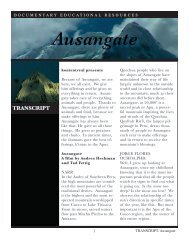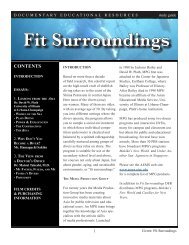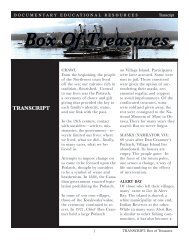Lessons from Gulam: Asian Music in Bradford - Documentary ...
Lessons from Gulam: Asian Music in Bradford - Documentary ...
Lessons from Gulam: Asian Music in Bradford - Documentary ...
Create successful ePaper yourself
Turn your PDF publications into a flip-book with our unique Google optimized e-Paper software.
D O C U M E N T A R Y E D U C A T I O N A L R E S O U R C E S study guide<br />
Up to 1986 there was very little provision for<br />
“<strong>Asian</strong> music”* <strong>in</strong> <strong>Bradford</strong> schools. Muslim<br />
reservations about the value of music were<br />
well known to school teachers. The dissertation<br />
of Patricia Jones, herself a teacher <strong>in</strong> <strong>Bradford</strong><br />
(Jones 1984), gives much valuable <strong>in</strong>formation.<br />
She found amongst Pakistani children<br />
at middle school level (95% of whom spoke a<br />
language other than English to their parents)<br />
that although some listened to a good deal of<br />
music at home (Western as well as <strong>Asian</strong>), very<br />
few had any <strong>in</strong>volvement <strong>in</strong> practical music<br />
mak<strong>in</strong>g. <strong>Bradford</strong> school teachers had noted<br />
that <strong>Asian</strong> children experienced problems with<br />
music classes <strong>in</strong> school. Out of a total of 1,010<br />
children receiv<strong>in</strong>g peripatetic <strong>in</strong>strumental<br />
lessons (<strong>in</strong> Western music) only 25 were <strong>from</strong><br />
“non-European families” (Jones 1984:37).<br />
Many teachers wanted to cater to the musical<br />
<strong>in</strong>terests of <strong>Asian</strong> children but felt they lacked<br />
adequate knowledge or resources.<br />
A small organization called Oriental Arts specifically<br />
aimed at “promot<strong>in</strong>g racial harmony<br />
through the use of music, dance and drama”<br />
<strong>in</strong> <strong>Bradford</strong>. It organized concerts and various<br />
music courses, and <strong>from</strong> time to time recruited<br />
groups of musicians to give <strong>Asian</strong> music workshops<br />
at the request of <strong>Bradford</strong> schools. In<br />
1986 <strong>Bradford</strong>’s Directorate of Educational<br />
Services had decided to adopt a more direct<br />
role <strong>in</strong> promot<strong>in</strong>g <strong>Asian</strong> music <strong>in</strong> school, and<br />
advertised for a co-ord<strong>in</strong>ator to organise a<br />
teach<strong>in</strong>g program. At the same time, the Directorate<br />
sponsored a series of school visits<br />
by the Oriental Arts team to give demonstration-concerts<br />
dur<strong>in</strong>g the spr<strong>in</strong>g and summer<br />
school terms. The Directorate wanted to move<br />
cautiously. They were afraid of a negative<br />
reaction <strong>from</strong> <strong>Asian</strong> parents who did not particularly<br />
want their children to be taught music<br />
<strong>in</strong> school, and who might view the teach<strong>in</strong>g<br />
of <strong>Asian</strong> music as a move calculated to underm<strong>in</strong>e<br />
traditional Muslim values. There had<br />
GUIDE: <strong>Lessons</strong> <strong>from</strong> <strong>Gulam</strong> 4<br />
been difficulties before over such issues as the<br />
provision of halal meat for school meals, and<br />
separate physical education for boys and girls.<br />
Another controversy was to be avoided if possible.<br />
Dur<strong>in</strong>g my first brief visit to <strong>Bradford</strong> <strong>in</strong> February<br />
1986, Champak Kumar, Co-ord<strong>in</strong>ator<br />
of Oriental Arts, gave me a list of a dozen<br />
<strong>Asian</strong> music groups <strong>in</strong> <strong>Bradford</strong>, and it was <strong>in</strong><br />
contact<strong>in</strong>g some of them that I first met <strong>Gulam</strong>*.<br />
<strong>Gulam</strong> is <strong>from</strong> the Khalifa community<br />
and a member of a hereditary musician family.<br />
He was brought up <strong>in</strong> Kenya and moved to<br />
Brita<strong>in</strong> <strong>in</strong> 1968. In Kenya he had worked as a<br />
storeman and semi-professional musician: his<br />
group Aaghaz Party had won the annual qawwali<br />
competition <strong>in</strong> Nairobi <strong>in</strong> 1964 and been<br />
awarded the silver cup. In <strong>Bradford</strong> he worked<br />
for British Rail for many years. An elder of<br />
the Khalifa community, former secretary of<br />
his local Khalifa Cultural Society, and member<br />
of the <strong>Bradford</strong> Council of Mosques, he was<br />
a man of some consequence. He ran a band<br />
<strong>in</strong> <strong>Bradford</strong> called Saz aur Awaz (“<strong>Music</strong> and<br />
Song”), which occasionally played at small parties<br />
and wedd<strong>in</strong>g festivities, particularly with<strong>in</strong><br />
the Khalifa community. The personnel of<br />
<strong>Gulam</strong>’s band varied over time, and consisted<br />
ma<strong>in</strong>ly of his Khalifa relatives, usually tra<strong>in</strong>ed<br />
by Gularn to be his accompanists. The group<br />
was essentially amateur, its members played<br />
together for their own enjoyment, ma<strong>in</strong>ly <strong>in</strong><br />
Sunday afternoon “rehearsals” at <strong>Gulam</strong>’s<br />
house. If they played at Khalifa wedd<strong>in</strong>g parties<br />
it was to fulfill community obligations.<br />
On rare occasions when they played at private<br />
parties, members of the band suspected that<br />
Gularn sometimes received payment but did<br />
not share the money.<br />
As a s<strong>in</strong>ger and harmonium player <strong>Gulam</strong><br />
specialised <strong>in</strong> a type of Muslim religious music<br />
called qawwali, which is widespread <strong>in</strong> India





